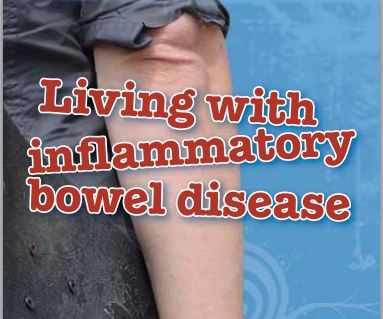
SCHOOL, SPORTS, AND IBD
A GUIDE FOR TEACHERS OF CHILDREN WITH IBD
IBD is often thought of as a “young person’s disease” because its onset is typically between the ages of 15 and 35, although it can certainly be diagnosed at a younger age.
The school’s involvement can help these students live normal lives, while lack of involvement and support from the school can lead to poor adjustment on the students’ part, which can then lead to:
- difficulties completing work on time;

- diminished academic performance;
- difficulties sitting exams;
- difficulties maintaining relationships with school friends;
- difficulties participating in school activities (e.g., physical education, excursions);
- lack of confidence, motivation, or self-esteem; and
- issues relating to body image
Many people with IBD live very normal lives, but students with IBD will most likely experience a disruption to their education, extra-curricular activities, and social life. IBD can also disrupt their
physical growth and maturity, especially during the critical stage of puberty and adolescence.
That’s why it is so important for teachers and other school personnel to understand these chronic intestinal illnesses. Such understanding will help provide the support and encouragement that may make all the difference in a child’s life.
What is Inflammatory Bowel Disease and how does it affect children?
The term Inflammatory Bowel Disease (or IBD) includes several long-term conditions that affect the bowel. The two main types are Crohn’s disease (CD) and ulcerative colitis (UC). In some children, it can be hard to distinguish between Crohn’s and ulcerative colitis – this is termed IBD unclassified (IBDU).
Crohn’s disease can involve any part of the bowel from the mouth to the bottom and can lead to pain, diarrhoea and difficulty maintaining weight. Ulcerative colitis, on the other hand, affects the large bowel (the colon) for variable distances from the bottom. Ulcerative colitis most commonly leads to bloody diarrhoea. Both Crohn’s disease and ulcerative colitis can lead to other symptoms as well – sometimes involving the joints or the skin as well as poor appetite, lethargy and other bowel symptoms. Very often, IBD can interfere with normal growth and development in children. This can mean that children with active IBD might lose weight, or have slow height gains or have a delay in entering into puberty.
Managing IBD in children
IBD can have effects not just upon bowel symptoms, but also upon normal day to day tasks. One of the aims of management of IBD in children is to ensure that children’s IBD has minimal impact upon everyday events, such as school and sports. Various treatments can be used to help with IBD in children. Common treatments are various daily medicines and special nutritional drinks. Some children will also need to have an operation to manage their disease.
Coping with IBD in childhood
Having a bowel problem is embarrassing and being different can have a profound effect on a young person’s self concept, body image and lifestyle. Children do not like to be different from their class-mates, especially in teenage years. Support and acceptance can be extremely helpful in assisting someone with IBD cope with their illness. Teachers can have a central and positive role in the provision of such support.
For the most part children with IBD will seem healthy, able to participate fully and can be treated normally. There generally are no limitations regarding activity, sport, or school camps when the child is in remission (is well). However, the effects of the illness and the side effects of treatment may sometimes be quite debilitating when a child is not in remission. At these times, children should take things quietly, and rest more than usual. Once the symptoms are back under control, they should restart their sports and exercise activities.
Toilet breaks
Diarrhoea and an urgent need to go to the bathroom are inevitable realities for many young people with IBD. For children and teens it is important to minimise the embarrassment of being different. It is important for children at school to be able to use the bathroom as frequently as needed: sitting by the classroom door may help so that they can leave as unobtrusively as possible.
Absences from class
Periods of illness, clinic visits and hospital stays can be common occurrences in the life of a child with IBD. Flexibility about learning schedules and deadlines can be helpful approaches. It may be important to talk to your student about lesson planning and arrange for homework to do while away from class.
Fatigue and lethargy
When their disease is active, the child may be extremely tired and listless and have trouble concentrating on school work. This is not laziness or acting out. Allowing short periods of rest in the sick bay at school may be helpful.
Physical education and sports
At times strenuous physical exercise may need to be modified for the student with IBD. Make these decisions in consultation with the student or their parents.
A change of clothes
Accidents happen. Having a change of clothes stored at school can be sensible. Teenagers could keep a change of clothes in their locker. It is helpful to keep a list of contact names and emergency contact phone numbers for the student.
Exam times
Although stress is not considered a cause of IBD, it is important to point out that exam times can be stressful for students and can lead to an increase in symptoms (often referred to as a relapse or flare-up). Whenever possible, it may be helpful to ask for extra toilet breaks and extra time to complete examinations.
What to tell classmates
Sharing the diagnosis with peers is encouraged to minimise feelings of isolation and the risks of teasing. However, the decision to inform other children in the class is the responsibility of the child or teenager and his / her parents. If this information is disclosed it is important that all children in your child’s class know that IBD is not contagious to others. A class science project may be a way of generating and distributing appropriate health information related to IBD.




